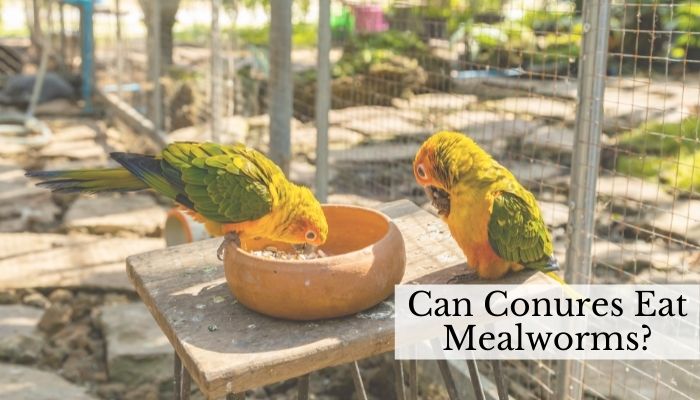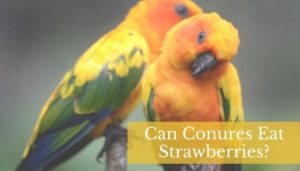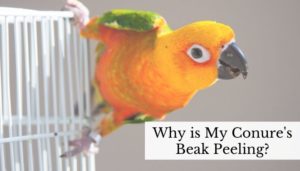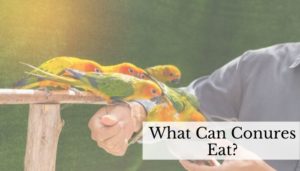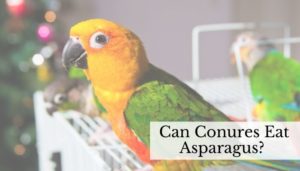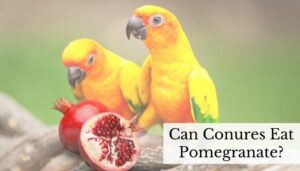If you’re on the hunt for a little bird with a larger-than-life (or, at least, larger than its size) personality, then you are sure to love the small but loud conure. As a small member of the parrot family, conures are comical and intelligent, and they’re always more than happy to keep you occupied throughout the day. Conures that are well-cared for tend to bond with humans, so expect a lively and chirpy addition to your home.
That being said, how do you keep birds happy? Beyond a safe home and constant attention, the best thing you can provide is a balanced diet.
But what is a balanced diet for a conure?
And can conures eat mealworms? The answer is yes. Conures enjoy eating mealworms. Conures are omnivores, and while they predominantly eat seeds, pellets, fruits, and vegetables, they also enjoy insects and larva. But while mealworms are a good source of protein and energy, they should only make up a fraction of your conure’s overall diet.
Keep reading to learn more about mealworms, their benefits to your conure, and so much more.
You might also like: List of What Conures Can Eat
Can Conures Eat Mealworms?
As previously mentioned above, yes, your conure will most likely enjoy having mealworms in its diet.
As larval forms of the mealworm beetles spread all over North America, mealworms are a rich source of protein, which your bird needs to stay strong, healthy, and active. Furthermore, mealworms can be fed live or dead (dried) and are usually readily available in most pet shops.
However, there are pros and cons to both live and dried mealworms.
For example, if your conure is used to eating formulated pellets, fruits, and vegetables, it might not immediately try mealworms and may even reject them. For this reason, it’s essential to ease your pet bird into the diet, mainly by introducing small chunks here and there.
Live mealworms are also more appealing to birds, as they still move and are generally more engaging to any bird. That said, live mealworms are a bit harder to maintain, especially if you are to cultivate them to provide a constant source of live feed. Furthermore, live mealworms can be pricier and are not as convenient.
On the other hand, dried mealworms are low-cost, convenient, and only require refrigeration for maintenance. However, they are far less appealing to birds, so you might need to mix them with their formula if you want them to try.
Of course, experiment here and there to find out your bird’s preferences, as each has its own.
However, even if your conure does end up liking mealworms, it should not make up a big chunk of its diet and should be fed to your pet moderately. Unfortunately, many owners end up not providing the proper nutrition to their pet birds by giving them too much of one thing. Like us humans, birds like conures and other parrot species enjoy variety and will likely benefit from it.
You might also like: Can Conures Eat Asparagus? (Explained)
Benefits of feeding mealworms to your conure
While they don’t look all that impressive, research on mealworms shows that these larvae are pretty remarkable from a nutritional perspective.
But suppose you feed mealworms to your conure, what exactly is your pet bird getting? According to experts, mealworms are chock-full of:
- Proteins – Birds have a primary need for protein, and the ones found in mealworms can help your conure build muscle and tissue.
- Potassium – Mealworms are also filled with potassium, which can help reduce blood pressure and water retention for your conure.
- Iron – Too little iron can cause anemia for your bird, so it is essential to provide them with a healthy resource now and then.
- Magnesium – Magnesium ensures that your conure’s brain, nerve, and reproductive health is in tip-top shape.
Outside of these minerals, there are also plenty of vitamins that your conure can enjoy, and this includes:
- B-vitamins (B1, B2, B3, B5, B7, B9)
- Choline
- Vitamin A
- Vitamin K
- Vitamin E
- Vitamin D
As you can see, mealworms add many nutrients, minerals, and vitamins to your bird’s diet, making these an excellent addition to their food.
You might also like: Can Conures Eat Strawberries? What You Should Know
How much mealworms should your conure eat?
While we have established that mealworms make for excellent food for your conure, it’s also essential to consider how much of it you can include in your pet bird’s diet.
This is because while they are nutritious, it’s easy to overlook a pet bird’s nutrition and end up either overfeeding them or completely missing their nutritional needs.
Because of this, we recommend feeding mealworms to your conure strictly only 1-3 times per week. If you’re providing them in smaller quantities, you can feed them more often; otherwise, make sure you practice moderation.
As a basis, allotting 15-20% of your conure’s diet should be mealworms, as the bulk of its diet should still be largely pellets and seeds, with a quarter for fresh fruits and vegetables.
As for how to feed them with these mealworms, you can either go live or dried. Live mealworms are more appealing, while dried mealworms are more affordable and easier to maintain.
It’s also essential to buy high-quality mealworms from a trusted supplier, as mealworms can also be contaminated. Otherwise, you should be good to go.
Related Questions
Can conures eat dried mealworms? Absolutely. Dried mealworms are simply mealworms that have been dried out in the sun. Before feeding them dried mealworms, make sure you rehydrate them with hot water for 30 minutes before draining and serving. Alternatively, you can also mix them with a balanced formula.
What is a good mealworm alternative that conures can enjoy? If mealworms aren’t available, there are plenty of other protein-rich options for your conure. This includes buffalo worms, Morio worms, calci worms, and waxworms. All are readily available from pet stores.
What foods should your conure avoid? As a general rule, any food that parrot types like cockatiels and budgies aren’t allowed to eat is also off-limits for conures. This means no feeding of avocados, chocolate, alcohol, apple seeds, and processed food. Avoiding fruits that are high in acid and fructose is also highly recommended.
Additional reading: Why is My Conure’s Beak Peeling? Is This Normal?
Conclusion
Your conure is an active and often loud ball of feathers that is sure to keep you company day in and day out. But you also have to do your part, and that means keeping it well-fed with a balanced diet.
Mealworms are one such example you can feed them, as these provide tons of vitamins and minerals that will keep your conure chirping for days on end.
However, remember to always practice moderation and restraint and keep everything balanced to make sure your pet is getting the best possible nutrition it needs.
